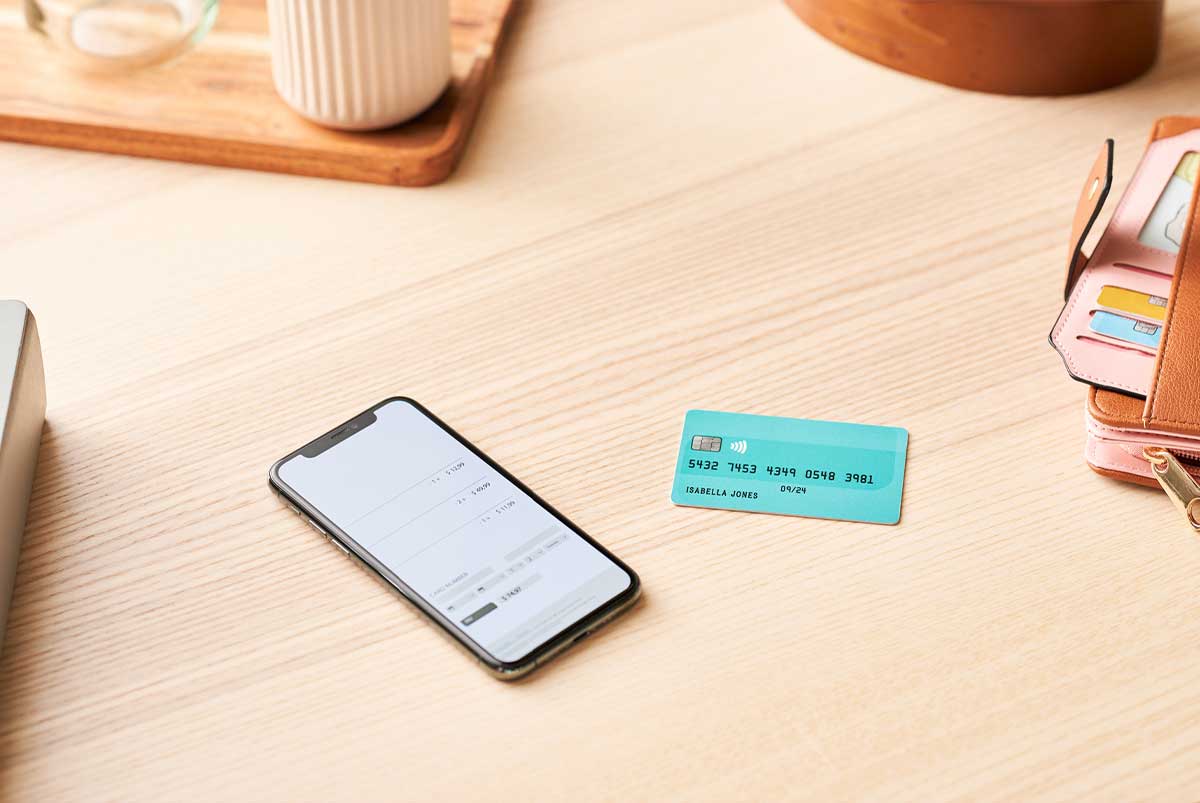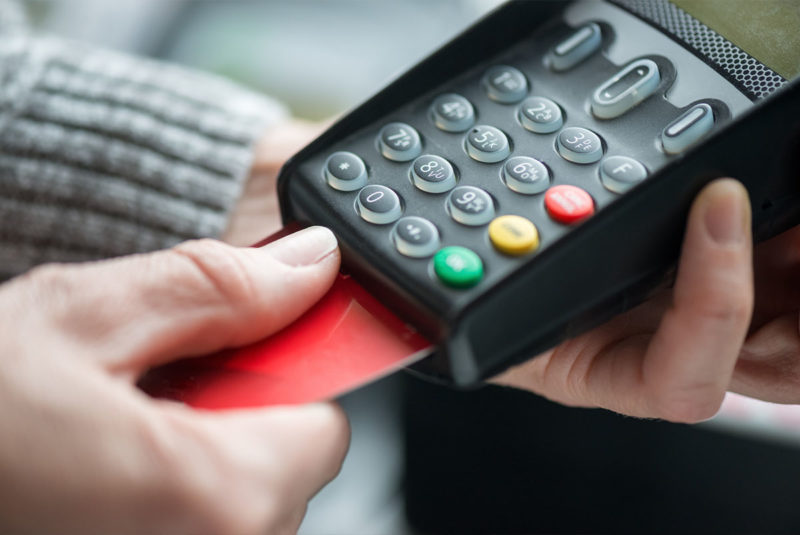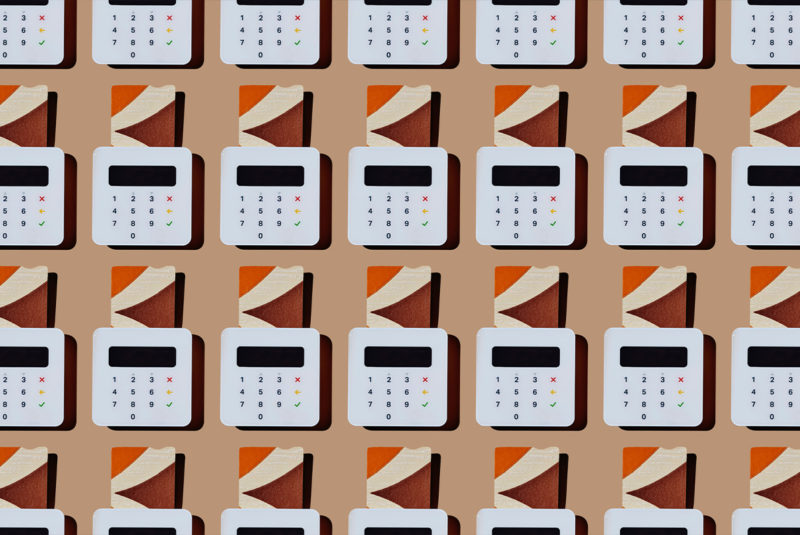Picture it: You get to the cash register and crack open your wallet. If you’re like a lot of us, you instinctively pull out your trusty piece of plastic — it’s either your debit card or your rewards credit card.
But have you ever stopped to wonder if your card of choice is actually the best choice? Simply put: is there ever a reason to switch to the other side?
There are lots of differences between credit cards and debit cards. And depending on your circumstances, there are times when it makes more sense to pick one over the other.
Credit Card vs. Debit Card: The Basics
Credit cards and debit cards are practically identical on the outside. But there are some key differences between these two pieces of plastic.
For starters, you automatically get a debit card when you open a checking account. The card gives you direct access to the money sitting in your account.
You have to be approved to get a credit card. That means filling out a card application and waiting for a credit card company to green light your application. Credit cards are revolving credit accounts (aka revolving line of credit). And your card’s credit limit is based on your creditworthiness, income, credit scores and credit history.
What’s the difference between an ATM card and a debit card?
Are you confused about the differences between an ATM card and a debit card? It doesn’t help that debit cards also work at ATMs — but debit cards are different from ATM cards.
ATM cards can only be used at ATMs and require a 4 — 6 digit PIN. A debit card, on the other hand, can work at ATMs to withdraw money from your bank account, and they can be used as, of course, a debit card or even a credit card when you go to pay for goods or services.
How Do Debit Cards Work?
Your debit card is basically a plastic check. When you use it to make a purchase, the money is immediately deducted (or debited) from your bank account. So, what does that look like IRL? Well, If you try to spend $500 when you only have $250 in your checking — it’s not gonna happen. Your bank will decline your transaction.
Three Types of Debit Cards:
- Standard debit cards: Standard debit cards tap into the cash that’s available in your checking account to make online purchases, money transfers and in-store purchases using a 4 — 6 digit PIN.
- Electronic benefits transfer (EBT): If you’ve been approved for Supplemental Nutrition Assistance Program (SNAP) or Temporary Assistance for Needy Families (TANF) benefits, you’ll receive an EBT card. EBT cards work like a debit or credit card and have a 4 — 6 digit PIN that must be used for transactions. It’s important to note that only certain items will qualify for payment on an EBT card.
- Prepaid debit cards: A prepaid card operates like a standard debit card. All prepaid debit cards have a 4 — 6 digit PIN, and the amount of money available depends on what you deposited into your account in advance.
The Advantages of Debit Cards
Debit cards are a great way to learn how money works when you are first figuring out how to budget.
Here are a few advantages debit cards have over credit cards:
A debit card is easier to get
Debit cards are issued when you open a checking account at a bank or credit union. A credit check isn’t required to open a checking account, making access to a debit card much easier than a credit card.
You can better avoid debt and help control spending
A debit card creates a financial guardrail against overspending. Because debit cards are linked to bank accounts, there’s a safeguard from spiraling into unmanageable debt. There’s also a cap on what you can withdraw every day. And because you can only spend what you have, your bank won’t authorize transactions your account can’t cover.
Save money on interest
Because you’re spending the money that’s in your bank account, you don’t pay fees each month like you would with a credit card when tapping into your line of credit.
Get ‘free’ cash from ATMs
If you use an ATM that’s in your bank’s network, you can make free withdrawals. If you go out of network, you may be charged a fee by the ATM and your bank.
No annual fee
There are no annual fees to keep your debit card active. As long as the checking account that’s linked to your debit card remains open, you can continue to use your debit card. While a debit card may not have any fees, some checking accounts come with monthly or annual fees to keep them open. Make sure you check with your bank to see if they charge account fees and how much the fees are.
No need to carry cash or checks
Cash can get lost or stolen. And it might be harder to keep track of your spending if you’re only spending with cash. Your purchases can be tracked in real time when you use a card.
Debit cards can be linked to receipts
Many stores track purchases when a debit card is used. If you lose a receipt and want to return an item, your debit card can be swiped to retrieve the receipt. And the refund can be applied directly to your debit card, too.
Debit cards are replaceable
If you lose your debit card, you can request a new one, and you’ll get it in the mail in just a few days. If it’s an emergency, some banks will send your debit card overnight.
Debit cards can help you save money
Some banks allow you to round up to the nearest dollar when you make a purchase with your debit card. The money that’s rounded up gets transferred to a linked savings account.
Shopping perks
Some banks have partnerships with companies to offer loyalty perks and discounted rates. Card-holder benefits can range from free museum or amusement park visits to discounted airline tickets.
Overdraft protection
Some banks allow you to link a savings account or a credit card account with a cash advance option to your debit card to cover any transaction overdrafts. It prevents a payment from being declined and helps you to avoid overdraft fees.
Overdraft protection typically costs around $10 per transaction. It ain’t cheap, but remember, overdraft protection can prevent you from being late on a payment, which could result in more expensive fees, having a utility suspended or having a bill sent to collections.
Disadvantages of Debit Cards
Is it better to have a credit card or debit card? Debit cards can be handy, especially if you’re learning how to manage money and don’t have a credit card yet. But there are disadvantages to using a debit card rather than a credit card.
Overdraft fees
Because a debit transaction takes money out of your bank account as soon as you swipe, it’s important to know you have enough money in your account to cover a purchase. While you won’t get a bill or pay interest on the purchase, you might be charged an overdraft fee — and overdraft fees can add up.
Overdraft fees can be as high as $35 for every attempted transaction. You may be able to get your bank to waive your first overdraft fee as a courtesy, but multiple fees can land you in collections if they’re left unpaid. Your bank may even close your account if you are in a deficit for an extended period of time.
It’s similar to bouncing a check. Your bank will deny the transaction, and it may charge you an overdraft fee. The person or company you were trying to pay may also charge you a fee. Like we said, fees can add up quickly, especially if several checks are being cashed on the same day.
No rewards benefits
Most banks do not offer rewards programs for debit cards. Using a debit card instead of a credit card could add up to missing out on cash rewards or earning travel miles.
Debit cards don’t help build your credit scores
When you use a debit card, it’s like you’re paying with cash or writing a check. Your debit card transactions aren’t reported to credit bureaus, so they can’t help demonstrate your reliability as a borrower.
Grace periods
Debit cards don’t come with grace periods — but credit cards do. The grace period is a set number of days (at least 21 days between the end of your billing cycle and the date your payment is due) a cardholder has to pay what they owe before interest gets added to their balance. If you pay off your entire balance before the grace period kicks in, you can avoid paying interest. This is one of the reasons why people prefer credit cards over debit cards.
How Do Credit Cards Work?
A credit card is a revolving line of credit. A debit card only allows you to access the cash you already have.
Many popular credit card issuers, like American Express and Discover, also issue debit cards and prepaid debit cards. Networks like Visa and Mastercard service both credit and debit cards.
When you open a credit card, it will come with a spending limit (aka a credit limit) that’s based on your credit history and credit scores.
Credit limits
Your credit limit is the maximum you can spend until you are “maxed out” and can no longer make card purchases. You won’t be able to use the card until you make a payment(s) to free up some cash or your credit card company increases your credit limit.
BTW, You’re typically eligible for a credit limit increase if you’ve demonstrated a strong repayment history.
A clean credit history, a high credit score, substantial income and a low debt-to-income (DTI) ratio may all work in your favor. The bottom line is this: The more a card company trusts you as a borrower, the higher your credit limit is likely to be.
Credit cards and usage
Every month, you’ll get a bill from your credit card issuer. While it’s widely recommended to pay off your entire bill to avoid interest charges, you’re only required to make the minimum payment. Your bill will include what you spent during the current billing cycle (minus any credits), any other charges on the account and any balance left over from the previous month.
Advantages of Credit Cards
If you only use your debit card, you’re missing out. There are some important credit card advantages we want to bring to your attention. If you’re eager to learn about these advantages and how you can get them all — keep scrolling down.
Build credit history
Sometimes credit cards get a bad rap. But, reputation aside, they’re actually one of the best ways to build healthy credit if you use them responsibly.
When you get a credit card, the credit card issuer usually reports the new card to the major credit bureaus — TransUnion®, Equifax® and Experian™ — so most credit cards do show up on credit reports.
When you use your credit cards responsibly, it can help you build a solid credit history and may improve your credit scores. That’s in stark opposition to debit cards and savings accounts. The activity on those accounts doesn’t affect your credit history at all.
And credit history matters because life without an established credit history can be a lot more challenging — and expensive.
You may not be able to rent an apartment or purchase a cellphone plan. And you may have to put down a deposit when you’re signing up for utilities or internet service. A solid credit history and good credit scores can also help you get better terms on car loans and mortgages.
If you want to establish credit or rebuild it, credit cards are much more powerful than debit cards.
Earn rewards
If you’re visiting your favorite coffee shop every day for your must-have latte, you might as well earn some rewards while you spend and caffeinate.
Here are the most common credit card rewards you can earn:
- Cash back: Get 1% — 5% of each purchase back as a statement credit. It’s like getting a small discount on everything you buy.
- Points or miles: Earn points or miles on every purchase you make and then redeem them for flights, hotel stays, statement credits and more.
Many credit card offers have a cash sign-up bonus (like a $200 statement credit) or extra points (like 50,000 bonus points). To get these bonuses, you usually have to spend a certain amount of money after opening the card. For example, a card might give you 50,000 bonus points after spending $3,000 within the first 3 months of opening the account.
If your credit history isn’t strong, you may not be able to qualify for a rewards card right away. But, as you build your credit, you may be able to qualify for better credit card offers over time.
Take advantage of ‘free’ short-term financing
When you shop with a debit card, the purchase is deducted from your checking account within a few days.
When you use a credit card, you get a grace period. That grace period allows you to totally avoid paying interest if you pay your entire statement balance before the payment due date.
In other words, you’re essentially getting an interest-free loan for the period between the date of purchase and your payment due date. This grace period typically lasts for at least 21 days.
Travel without worry
When you’re on the road, debit cards can present some problems.
Many hotels, gas stations and rental car companies place holds on customer cards until they arrive at a final cost.
Let’s say you’re checking into a hotel for 5 days. If the hotel charges $200 a night, the hotel will likely place a hold of $1,000 on your account, plus extra money for any incidentals.
If you’re using a debit card, your money will be frozen until you check out.
Problem number two: The hotel may not accept your debit card. Many hotels require credit cards.
When you use a credit card, a hold reduces your available credit — not the money that should be available to you in your bank account. Unless your credit card is close to being maxed out, use your credit card to avoid putting a damper on your vacation budget.
Get additional benefits
Depending on your credit card issuer, you may be eligible for additional benefits:
- Protection on purchases (including extended warranties on electronics)
- Travel perks (including rental car insurance and airport lounge access)
- Miscellaneous services (including concierge services to help you buy tickets or make hard-to-get restaurant reservations)
Though credit card companies don’t advertise these benefits as much as their rewards programs, they can still be extremely valuable.
Best of all, you usually don’t have to do anything to get these benefits. Let’s say you buy a smart TV with your credit card, you may automatically get an extra year on the warranty without lifting a finger. Not a bad perk considering our appliances and electronics usually act up just as the manufacturer’s warranty expires.
Some credit cards even have 0% introductory APR periods for balance transfers and purchases. These cards are savvy ways to avoid interest charges. (But you’ll still need to make your minimum monthly payments!)
If you’re using a card with an 0% intro APR to transfer a balance(s), during the intro period, you won’t be charged any interest while you pay down or pay off what you transferred.
If you’re using a card with an 0% intro APR for purchases, what you buy won’t accrue interest during the intro period.
What if You Pick ‘Credit’ When You Swipe Your Debit Card?
Sometimes you’re at the register, and you can opt to choose “credit” to complete a transaction with your debit card. In those cases, you may have to provide a signature rather than a PIN (or the transaction may require no verification).
But, spoiler alert: choosing “credit” won’t make your debit card act any more like a credit card.
That means the transaction won’t help you establish credit history, and it won’t give you additional consumer protections. Selecting “credit” or “debit” just determines how the merchant processes the card and what fees they pay.
Fraud Protection: Are Debit or Credit Cards Safer?
Whether you’re a victim of credit card fraud or debit card identity theft, federal law protects you. And it also dictates your level of financial liability for fraudulent transactions.
Debit card vs. Credit card transactions
So, should you be more concerned about losing your debit card or losing your credit card? Given the level of fraud protection, losing your debit card might present a bigger risk.
If someone uses your credit card without your permission, you have time to report and manage the fraud before your bill is due.
The Fair Credit Billing Act (FCBA) caps the liability of credit card users at $50. Most credit card issuers take this a step further and don’t charge cardholders anything for fraudulent charges. Even if your card issuer doesn’t offer that protection, the FCBA says you’re not responsible for any unauthorized charges if you report the card lost or stolen before it’s used.
Limited liability is one of the main reasons why experts recommend using credit cards over debit cards – especially for online purchases.
With a debit card, the money leaves your account immediately. And, depending on your bank, it might take weeks or months to get your money back. In the meantime, you could miss bill payments or be forced to borrow money to cover your day-to-day expenses.
Debit card fraud protection is covered by the Electronic Funds Transfer Act.[1]
Here’s what you could owe, based on when you report the loss or theft of your debit card:
- Before any unauthorized purchases are made: $0
- Within 2 business days of learning about the loss: up to $50
- More than 2 days after the loss: $500
- More than 60 days from when your statement was sent: The entire balance of the fraudulent charges.
If you ever lose your debit card, you’d face exponentially more liability than you would with a credit card.
Debit or Credit: Which Card Is Right for Me?
Debit cards are easy to get and work like cash. The primary benefit of debit cards is that they make it harder to spend money you don’t have.
And, depending on your spending habits, that could be just the benefit you need. If you’re prone to splurges and spending sprees, a debit card is the safer choice. Paying sky-high interest charges, damaging your credit and spiraling into uncontrollable credit card debt isn’t worth the perks.
Some credit cards have annual fees, while debit cards often have no fees at all. However, in many cases, what you get in credit card benefits usually makes the card worth the annual fee.
Debit cards provide fast access to cash, which can be handy. Just keep in mind that speedy access to cash is one reason why losing a debit card is so dangerous. If your card is stolen, whoever took it may also gain speedy access to your cash.
If fraud is a major concern for you, you may feel safer using a credit card to get cash. Just keep in mind that when you use a credit card for a cash advance, you’ll likely have to deal with high fees, and interest on the advance starts accruing immediately.
If you’re afraid of credit cards because they’ve been demonized by personal finance bloggers or some finance experts, we’d encourage you to face your fears. If you can use a credit card responsibly, it can be a benefit for you, your lifestyle and your credit history and score. Remember, debit cards don’t help build credit, and credit cards typically provide more consumer protections.
If you can handle the responsibility, don’t avoid credit cards. Avoid poor credit card management, late payments, and if you can afford it, a revolving balance.
Responsible credit use can open up a treasure trove of benefits — including rewards, extended warranties on electronics, flexible travel booking, credit building potential and fraud liability protection.
If You’re Financially Responsible, Credit Cards Are the Way To Go
Debit cards can help you manage your money — but they come with limitations.
If you’re looking for flexibility, convenience, credit-building potential and stronger fraud protection, credit cards are the better bet.
And remember, just because you have a credit card doesn’t mean you have to use it. But if you plan on using it responsibly, it means that when you need to use it, you know you can do it without hurting your wallet or your financial goals.
The Short Version
- Credit cards are great for international travel because they don’t charge transaction fees overseas
- Credit cards and debit cards both offer some form of fraud protection
- Using a credit card is tapping into a revolving line of credit. When you use a debit card, you’re using the money in your bank account
The Federal Reserve. “Electronic Funds Transfer Act.” Retrieved May 2022 from https://www.federalreserve.gov/boarddocs/caletters/2008/0807/08-07_attachment.pdf




